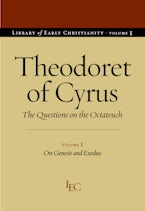- Home
- Fathers of the Church: A New Translation
- religion
- Commentary on the Psalms, 1-72
Preparing your PDF for download...
There was a problem with your download, please contact the server administrator.
Commentary on the Psalms, 1-72
Fathers of the Church: A New Translation
Translated by Robert Hill
Imprint: Catholic University of America Press
This volume makes available for the first time in English the major biblical commentary by one of the leading exponents of Antiochene exegesis, Theodoret, bishop of Cyrus. Though originally intended as an opening to his exegetical work—in the manner of his predecessors in this school, Theodore of Mopsuestia and John Chrysostom—Theodoret's Psalms commentary comes from his later ministry in the decade before the Council of Chalcedon, which he was instrumental in convening. It thus documents current christological and trinitarian concerns and illustrates an Antiochene hermeneutic that rests firmly on the literal sense of the "inspired composition of the mighty David."
Though commentators less well acquainted with this lengthy work have been ready to dismiss Theodoret as lacking originality, a sounder assessment would acknowledge his willingness to take account of previous work, from both Alexandria and Antioch, and steer a middle course. He deliberately avoids the excesses of allegorical interpretation of Origen, on the one hand, and of the historicism found in Diodore and Theodore, on the other. Moderation and flexibility are the hallmarks of his own approach to the Psalms, to which he comes not as scholar or preacher but as teacher and pastor. He aims simply to offer his readers "some benefit in concentrated form."
This translation respects the conciseness which the bishop sets as one aim for himself, his other principle being to let the text speak for itself. Theodoret emerges in this work as a measured commentator and balanced exponent of his school's hermeneutical and theological principles.
Theodoret's Commentary on the Psalms, 73-150 will be the next volume published in The Fathers of the Church series.
With this 101st volume in The Fathers of the Church series, the Press continues its commitment to this remarkable series and to publication in early Christian studies. The first one hundred volumes have been widely praised for maintaining a uniform excellence in translation and for providing a core library of early Catholic literature. Commended for their accuracy and accessibility, these volumes continue to attract a diverse readership, students and laymen as well as historians, theologians, and patristic scholars.
Robert C. Hill teaches in the School of Studies in Religion at the University of Sydney. He is the author of numerous works and the translator of Saint John Chrysostom's Homilies on Genesis, volumes 74, 82, and 87 in The Fathers of the Church series.
"Hill's translation of the Commentary on the Psalms is the first in English, and the quality overall is superlative. It is fluid, lively, technically astute, and richly annotated with helpful comments on the biblical recensions with which Theodoret is working, the peculiarities of his interpretive method, and the nuances of specific exegeses. In numerous notes Hill brings Theodoret into conversation with modern commentators on the Psalms... Hill's translation of this massive commentary is a welcome addition to the ever-expanding Fathers of the Church series. It will doubtless be received as a major contribution to the still-burgeoning study of patristic biblical interpretation and adds itself to a growing list of important studies of the bishop of Cyrus."
~Journal of Early Christian Studies
"Robert C. Hill combines biblical and patristic expertise in presenting a translation, with copious notes, of the work of a major exponent of Antiochene exegesis."
~Old Testament Abstracts
"[This book] represents the first fruits of the second stage in a long-term project which Robert Hill has set himself: to make available to biblical scholars and students of the patristic era the exegetical works of the fathers situated within the so-called Antiochene tradition, with emphasis on works which address the books of the Old T"











